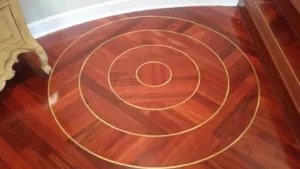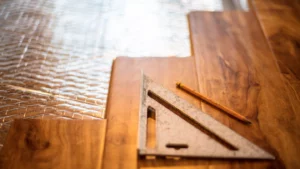Are you about to install new floors or do any type of flooring work in your home? Then it’s time to read this blog post! Here are 10 things that you must know before you hire someone to install flooring.

1) What types of materials will be used
This is a question that many people don’t ask, but it’s important because different material options have different pros and cons. For example, laminate may be the cheapest option, while wood or tile are more expensive but can last longer. The best way to find out what the right choice is for you is to talk with a professional who knows all the details when you hire someone to install flooring. We can show you all the different types of materials, tell you which ones are available in your area, and help you figure out the best choice for your needs.
What product will be installed where?
Once again, it’s important to know what type of material is being used before choosing a specific one. For example, consider getting luxury vinyl flooring installed in an area that has a lot of moisture.
The best way to find out which materials can be used where is by contacting us for a consultation and design session. We will do the research and present you with all your options along with their specific
2) How many square feet does your house have?
Knowing how much area needs flooring installed helps determine how much material is needed. So, if you have a house that is 1,000 square feet then it’s best to buy 1,100 square feet of flooring to account for cutting waste. This will provide just enough flooring for your home without buying too much or not having enough left over to do every room in the place.
Measuring the square footage of a room
First, you need to know how many feet are in your bedroom. You should always measure the 2 longest distances. If it is 20 feet long and 10 feet wide, then that is 200 square feet. If you want to get luxury vinyl installed, then you need to buy 220 square feet of material.
This is not always easy in odd shaped rooms. That’s why many homeowners ask us to do it for them so they don’t have to fuss with tape measures. We can do it quickly and easily using our lasers. This tool converts the length of your floor into linear footage in seconds.

3) Ask your friends about their experiences before you hire someone to install flooring
One of the best ways to judge how good a company will be is by looking at what other people have said about them. If you know someone who had new floors installed recently, then ask them if they were happy with the job that was done. They can tell you if the installation process was on time, whether or not they were happy with the materials used and so forth.
The Nextdoor neighborhood app and
This community-verified website makes it easy to find and contact people living in your area, so you can ask them about their experience with different flooring companies.
Google business reviews
Another great resource is to learn from other homeowners’ experiences when you hire someone to install flooring – cue Google Business Reviews. Just type in your zip code and then search/scroll through all the reviews that have been submitted by actual customers. This will give you an idea of whether the installer did quality work, if they were professional and punctual, etc…
4) How much does it cost to get flooring installed?
Knowing the current prices of the materials and installation help with budgeting and give you a ballpark figure of what you can expect to pay for your new floor. A good rule of thumb is to buy about $4.00 per square foot of material, though it could be more or less depending on the product used. You should also know that there is a lot of waste on larger jobs, which means that the price per square foot will go down as you get more material.
The first step to pricing is figuring out the square footage of your home. This can be done by measuring the largest length and width in each room (remember some rooms are irregularly shaped). You should come up with a total number of square feet and multiply it by $4.00 to give you a basic estimate, but be sure to ask your designer/salesperson if this is an accurate enough figure for the materials you have chosen .
For example:
If you have a living room that is 20 feet long and 30 feet wide then 20 x 30 = 600 total square feet. If you multiply that by $4.00 then you get $2,400 needed for the material to cover the room in luxury vinyl tile (LVT). We would recommend you buy around 660 sq ft of LVT in total because it tends to waste a little less than hardwood.
5) What’s the difference between installation quality?
You should also know that a lot of the top vinyl flooring companies have different levels of installation quality. Many homeowners assume that all installers do an equally good job, but they don’t. The best ones use premium products and have special training in laying down sheet vinyl or luxury vinyl tile (LVT).
If you buy from a company that uses lower quality products and/or has less experience in installing certain types of flooring, then you may end up having to call a contractor or your salesperson back out to the house because there are gaps between the tiles or the sheet vinyl buckles. This is referred to as contract installation and it can get very expensive if you’re not prepared for it.
6) How much time will it take to have the flooring installed?
If you are looking into quick installations then it’s best to look into floating floors that do not need glue or nails. On the other hand, if you have a lot of free time on your hands then hardwood would be great because it has longer installation duration. Sheet vinyl is somewhere in between and luxury vinyl tile (LVT) falls directly into the middle.
7) What should I keep in mind about my furniture when I you hire someone to install flooring?
A lot of people assume that hardwood is better than sheet vinyl and luxury vinyl tile (LVT) because it’s more natural, but this is not necessarily true. Because sheet vinyl and luxury vinyl tile (LVT) are made synthetically, they tend to have a better resistance against scratches, scuffs and dents than your hardwood’s finish.
Regardless, Midwest Flooring Company will consult with you regarding anything that needs to be done with your furniture – keep that in mind when you hire someone to install flooring.
8) How easy is it to clean?
This is an important factor to consider if you have pets or small children. Hardwood can get scratched up by pet nails, paws and dust bunnies, but the same thing doesn’t happen to sheet vinyl or luxury vinyl tile (LVT). So if you are looking for durable flooring that will last a long time then hardwood is not the best choice.
You should also ask your designer/salesperson what kind of maintenance is required for the types of flooring you’re looking at. For example, you’ll need to wax hardwood floors regularly in order to keep them shining, but LVT requires virtually no maintenance and laminate only needs occasional cleaning.
9) How much noise does the floor make?
Sheet vinyl and luxury vinyl tile (LVT) make virtually no noise when you walk on them and hardwood can be a little loud. If you need your flooring to provide soundproofing, then sheet vinyl and LVT would be the best options because they also have strong resistance towards impact noises. Especially products with premium underlayments.
10) How durable is the flooring installed?
“In the end, it’s not the floor that you should always buy. It’s the quality of workmanship and materials.”
It should also be a known fact to you that every vinyl company says their floors are going to last a lifetime, but they’re all lying! This is because there are certain wear factors that can never be explained by the manufacturer. For example, how much traffic is in your house? What kind of footwear do you have when walking around it? Do you have children or pets that could possibly leave a mark on it?
In order to figure all of this out, the best thing you can do is call a vinyl flooring installation company and ask them what products they’re using in your area and if they can send you pictures of their previous jobs so you can get a feel for their quality.
In the end, it’s not the floor that you should always buy. It’s the quality of workmanship and materials. Does their staff seem confident and trustworthy about what they’re saying?
It is important that you know everything there is about the flooring you’re looking for. A lot of people tend to buy on impulse because they’re tired of looking around, but it’s really difficult changing your mind about the floor once you’ve bought it. So if you intend on purchasing some new flooring, then be sure that you know what kind of installation method is required and what kind of materials you’re going to be using.
Wrap up
Asking these questions before purchasing flooring for a home is the best way to ensure an effective purchase when you go shopping. The more research that goes into a purchase decision, the better the advice you will be able to give yourself as a future floor owner. Now that you have all of these questions, go ahead and do some more research on your own on floors so that you can really narrow down what type of floor is going to work best for your house!
We want to help you get the best flooring for your home. Here are 10 things that you need to know before getting any floor installed in your house. If you’re not sure about anything, give us a call today at (913)808-5383 or request an estimate below!











